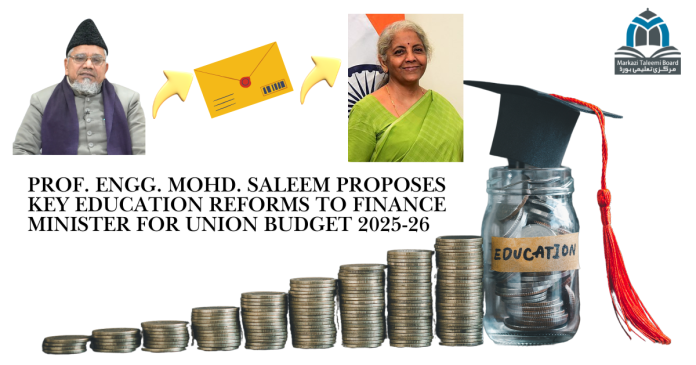New Delhi: Professor Engineer Mohammed Salim, Chairman of the Markazi Taleemi Board, has submitted a detailed letter to Ms. Nirmala Sitharaman, Union Minister of Finance, presenting suggestions for the forthcoming Union Budget 2025-26. These recommendations focus particularly on improving the educational standards of minorities and backward classes, as well as their social and educational development.
Professor Salim highlighted that India’s current expenditure on education, which stands at only 2.9% of the GDP, is significantly below global standards. In light of this, he proposed increasing the education budget to 6% of the GDP, in line with the recommendations of the National Education Policy (NEP) 2020. He further emphasised the need to halt the privatisation of education and ensure that education remains accessible to every citizen.
Regarding higher education, Professor Salim suggested a reduction in the fees of prestigious institutions like IIMs, IITs, NITs, and medical colleges. This would make these high-quality institutions more accessible to a larger number of students. He also recommended increasing both the number and amount of scholarships and urged the allocation of more funds for infrastructure, laboratories, libraries, and digital libraries in higher education institutions. Additionally, he emphasised the importance of a substantial increase in research and fellowship grants.
Further, Professor Salim underlined the necessity of expanding merit-based scholarship schemes for minority communities, Scheduled Castes (SC), Scheduled Tribes (ST), Other Backward Classes (OBC), and other marginalised groups under the central government. He also proposed strengthening the Information and Communication Technology (ICT) infrastructure in minority areas and called for an increase in the number of schools in rural regions to ensure greater access to education for underprivileged communities. He recommended the establishment of universities dedicated to research and education in traditional crafts and skills, such as carpet weaving in Bhadohi, metalworking in Moradabad, and Bidri work in Bidar, as well as the introduction of skill-based diploma and graduation courses in these regions.
Professor Salim also emphasised the need to enhance the effectiveness of school management committees for minorities and marginalised communities. He advocated for the introduction of special teacher training programs and the establishment of counselling centres in minority areas to address both the educational and emotional needs of students and teachers.
To improve the educational standards of Muslims, Professor Salim proposed the construction of hostels for Muslim girls in minority districts. He also recommended setting up a special commission to assess the educational status of Muslims and suggested the introduction of a special scholarship scheme for Muslim students graduating from colleges. Moreover, he called for improvements in Urdu-medium schools, the allocation of a special budget for them, and the upgrading of madrasas to align with modern educational systems, including the provision of technical facilities.
In conclusion, Professor Engineer Mohammed Salim appealed to the Finance Minister to incorporate these suggestions into the upcoming Union Budget, which would not only contribute to the educational progress of minorities but also enhance their social and economic conditions. He stated that these proposals would be a significant step towards providing a better educational system for minority communities.




